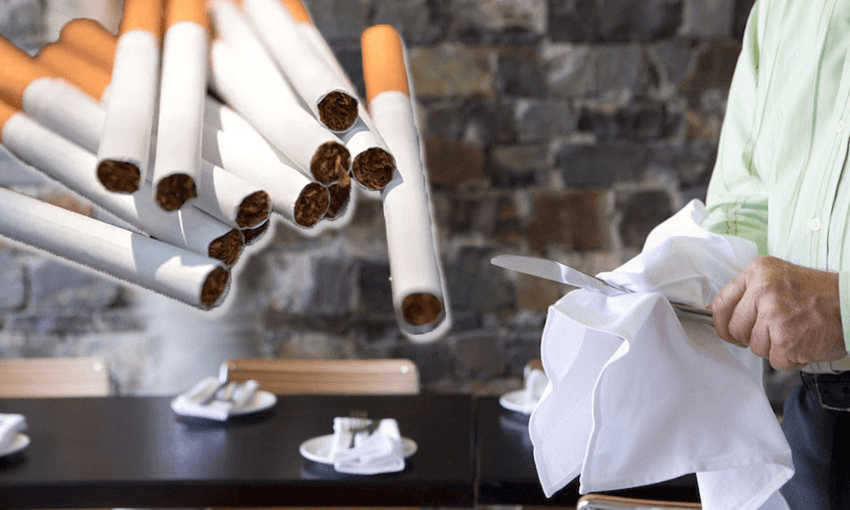The reward for being a smoker in the hospitality industry? Extra break time than non-smokers, causing many hospo workers to pick up the bad habit.
For years it’s been a running joke in the hospitality industry that in order to get more breaks, young workers should start smoking. But it turns out there’s actually some truth to that statement.
Josh is 19 and has been working in hospitality for just over two years as a waiter at a popular Auckland restaurant. He started smoking after noticing his workmates getting almost double the breaks he was entitled to because they smoked.
“In my old job you would only get one break per shift if you didn’t smoke,” he says, “I have one friend who doesn’t smoke and has been with me in both of my jobs and sometimes she doesn’t get breaks. We work the same hours and she won’t get a break but I will because I smoke.”
Josh isn’t the only one with this story. Jen also started smoking because her hospitality job allowed smokers extra breaks during shifts, but three years into her hospitality career, Jen’s now addicted to nicotine.
“In 2017 I developed anxiety and I think part of that was due to how much I was working… On a 15-hour shift when you would only have one 30 minute break, that’s when you start smoking.”
She estimates that when she first started working at a popular Wellington venue, smokers were getting 15-20 minutes more break time than other employees over a 10-hour shift.
“If you were asking for a smoke break it was expected that you would be given one. It may not be right away but the manager would rarely say ‘no’ compared to other breaks.”
Sophie Gilmour is the owner of hospitality consultancy Delicious Business. She has worked in the industry for years and says smoking is not a new issue in hospitality.
“This certainly applied during all my days as a waitress in hospitality: the smokers got guaranteed breaks and everyone else’s were [often] up for debate.”
Gilmour says a lot of places are aware of this issue. The business she used to own would time everyone’s breaks to make sure they were fair for all employees, but not all businesses do.
A Smokefree New Zealand spokesperson said the organisation did not want to comment as the issue was “not one [they] have heard about or have any information or research on.”
But Jen and Josh say it’s an issue everyone they work with knows about. Jen knows countless others who have taken up smoking because of the job.
“I’ve noticed it with quite a few of my friends. Hospo is a lot of fun but it can be monotonous so having those extra five-minute smoke breaks throughout the day really helps to break it up.”
But what about employee health? Marisa Bidois from Restaurant NZ says there have been significant moves towards wellbeing in hospitality over the past few years.
“I hear more from members creating opportunities to connect with their teams over staff meals rather than smoke breaks,” she says, but agrees smoking has been an issue in the past.
“I think historically [the issues surrounding] smoking and breaks were accurate in some workplaces, but there has been a big shift in our industry in the last five-to-10 years with regard to this.”
The change of break laws in the Employment Relations Amendment Act 2018, which came into effect in early May, could also help stop people from picking up the habit.
“Now if you work a six-to-10 hour shift, you’re entitled to two 10-minute breaks and one half-hour break, so people who smoke are probably doing that during their 10s now,” says Jen.
Gilmour says good businesses also need to be creating new rituals in place of smoking.
“I used to put my feet in iced water for 15 mins when I’d been on them for 14 hours! Massage or meditation facilities would be a good time. What about subsidising gym memberships or providing an incentive for not smoking?”
Josh says at no point has anyone at his work expressed concern that he’s started smoking because it’s so commonplace in the industry. Before he started smoking, Josh sometimes wouldn’t get any breaks. He knows it’s illegal, but in the high-turnover industry for many young workers, it’s easier to pick up a cigarette than to start an employment dispute.
“From a legal standpoint you’re supposed to have a break after every six hours of work and that’s written into my contract but that never happens, so even if there was a law to change it I don’t know how or if it would ever change.”
As the target of Smokefree 2025 looms closer there is a lot of scepticism that this target will be reached. In 2017/18, 15% of New Zealand’s population were regular smokers. To hit that ‘Smokefree’ target, the government wants to get this number down to under 5%. According to the New Zealand Health Survey, between 2006/07 and 2017/18, the rate of smoking fell just 5%. From now until 2025, this rate of decline would need to more than double.
